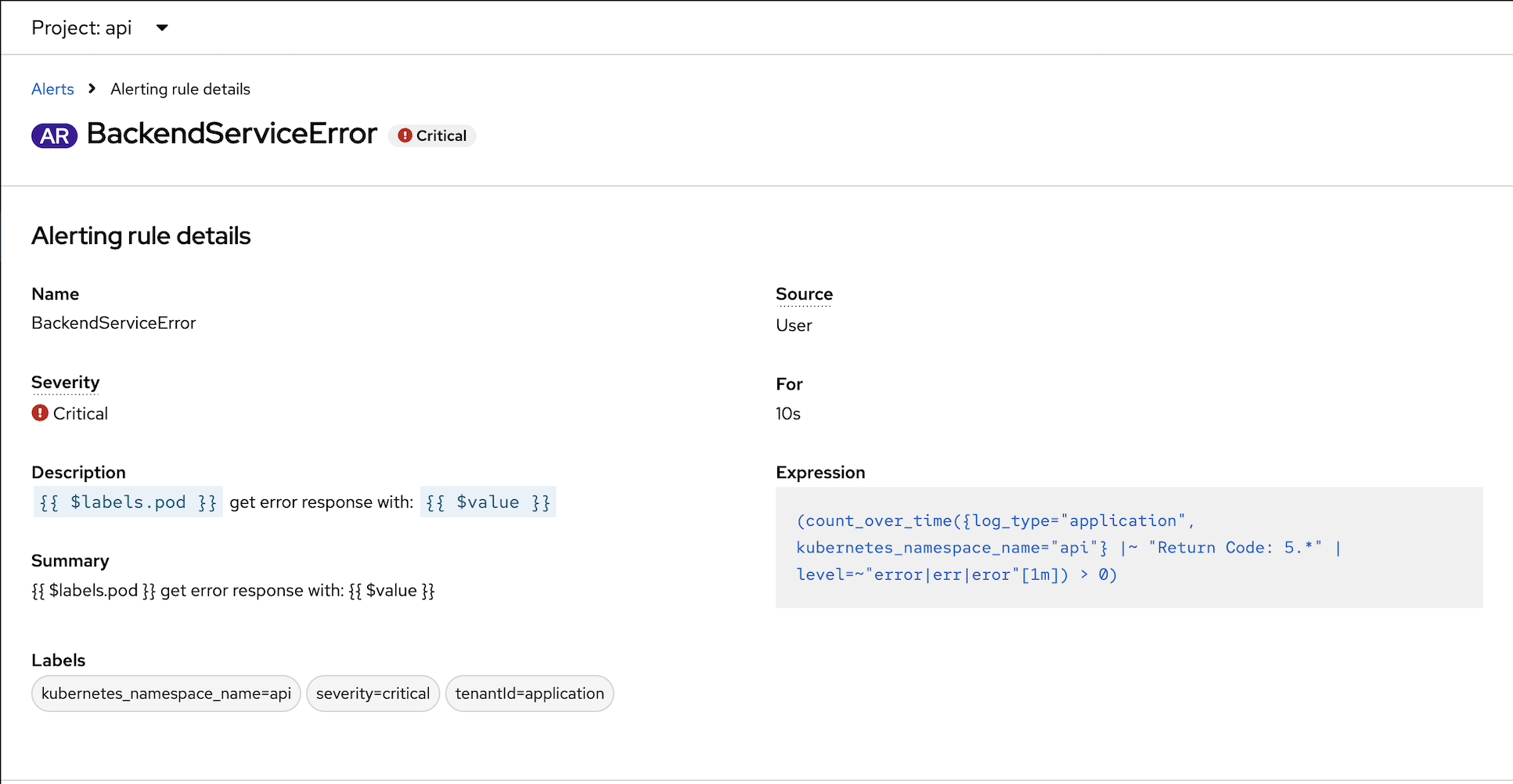Logging with Loki
Install and Config
Install Logging Operator and Loki Operator
oc create -f manifests/openshift-logging-ns.yaml oc create -f manifests/logging-operator.yaml oc create -f manifests/loki-operator.yaml sleep 60 oc wait --for condition=established --timeout=180s \ crd/clusterlogforwarders.observability.openshift.io \ crd/lokistacks.loki.grafana.com oc get csv -n openshift-loggingOutput
namespace/openshift-logging created operatorgroup.operators.coreos.com/cluster-logging created subscription.operators.coreos.com/cluster-logging created namespace/openshift-operators-redhat created operatorgroup.operators.coreos.com/openshift-operators-redhat created subscription.operators.coreos.com/loki-operator created customresourcedefinition.apiextensions.k8s.io/clusterlogforwarders.observability.openshift.io condition met customresourcedefinition.apiextensions.k8s.io/lokistacks.loki.grafana.com condition met NAME DISPLAY VERSION REPLACES PHASE cluster-logging.v6.2.3 Red Hat OpenShift Logging 6.2.3 cluster-logging.v6.2.2 Succeeded loki-operator.v6.2.3 Loki Operator 6.2.3 loki-operator.v6.2.2 Succeeded
Create Logging Instance
Create Service Account and assign cluster roles to service account.
Use CLI
oc create sa collector -n openshift-logging oc adm policy add-cluster-role-to-user logging-collector-logs-writer -z collector -n openshift-logging oc adm policy add-cluster-role-to-user collect-application-logs -z collector -n openshift-logging oc adm policy add-cluster-role-to-user collect-audit-logs -z collector -n openshift-logging oc adm policy add-cluster-role-to-user collect-infrastructure-logs -z collector -n openshift-loggingUse YAML files
oc create -f manifests/cluster-logging-operator-role-binding.yamlCreate ClusterLogForwarder instance
oc create -f manifests/cluster-log-forwarder.yamlPrepare Object Storage configuration including S3 access Key ID, access Key Secret, Bucket Name, endpoint and Region
In case of using ODF
Create Bucket
Admin Console
- Navigate to Storage -> Object Storage -> Object Bucket Claims
- Create ObjectBucketClaim
- Claim Name: loki
- StorageClass: openshift-storage.nooba.io
- BucketClass: nooba-default-bucket-class
CLI with YAML
oc create -f manifests/loki-odf-bucket.yaml
Retrieve configuration into environment variables
S3_BUCKET=$(oc get ObjectBucketClaim loki -n openshift-storage -o jsonpath='{.spec.bucketName}') REGION="''" ACCESS_KEY_ID=$(oc get secret loki -n openshift-storage -o jsonpath='{.data.AWS_ACCESS_KEY_ID}'|base64 -d) SECRET_ACCESS_KEY=$(oc get secret loki -n openshift-storage -o jsonpath='{.data.AWS_SECRET_ACCESS_KEY}'|base64 -d) ENDPOINT="https://s3.openshift-storage.svc:443" DEFAULT_STORAGE_CLASS=$(oc get sc -A -o jsonpath='{.items[?(@.metadata.annotations.storageclass\.kubernetes\.io/is-default-class=="true")].metadata.name}')
If you want to test with existing S3 bucket used by OpenShift Image Registry
S3_BUCKET=$(oc get configs.imageregistry.operator.openshift.io/cluster -o jsonpath='{.spec.storage.s3.bucket}' -n openshift-image-registry) REGION=$(oc get configs.imageregistry.operator.openshift.io/cluster -o jsonpath='{.spec.storage.s3.region}' -n openshift-image-registry) ACCESS_KEY_ID=$(oc get secret image-registry-private-configuration -o jsonpath='{.data.credentials}' -n openshift-image-registry|base64 -d|grep aws_access_key_id|awk -F'=' '{print $2}'|sed 's/^[ ]*//') SECRET_ACCESS_KEY=$(oc get secret image-registry-private-configuration -o jsonpath='{.data.credentials}' -n openshift-image-registry|base64 -d|grep aws_secret_access_key|awk -F'=' '{print $2}'|sed 's/^[ ]*//') ENDPOINT=$(echo "https://s3.$REGION.amazonaws.com") DEFAULT_STORAGE_CLASS=$(oc get sc -A -o jsonpath='{.items[?(@.metadata.annotations.storageclass\.kubernetes\.io/is-default-class=="true")].metadata.name}')
Create Logging and Loki Instances
cat manifests/logging-loki-instance.yaml \ |sed 's/S3_BUCKET/'$S3_BUCKET'/' \ |sed 's/REGION/'$REGION'/' \ |sed 's|ACCESS_KEY_ID|'$ACCESS_KEY_ID'|' \ |sed 's|SECRET_ACCESS_KEY|'$SECRET_ACCESS_KEY'|' \ |sed 's|ENDPOINT|'$ENDPOINT'|'\ |sed 's|DEFAULT_STORAGE_CLASS|'$DEFAULT_STORAGE_CLASS'|' \ |oc apply -f - watch oc get po -n openshift-loggingOutput
secret/logging-loki-s3 created lokistack.loki.grafana.com/logging-loki created clusterlogging.logging.openshift.io/instance created NAME READY STATUS RESTARTS AGE cluster-logging-operator-55c4c68fbf-79nkz 1/1 Running 0 10m collector-42nzt 1/1 Running 0 4m32s collector-pd9mx 1/1 Running 0 4m32s collector-snjm5 1/1 Running 0 4m32s collector-trtz8 1/1 Running 0 4m32s logging-loki-compactor-0 1/1 Running 0 4m43s logging-loki-distributor-84b75dd686-n2d88 1/1 Running 0 4m43s logging-loki-distributor-84b75dd686-v48z2 1/1 Running 0 4m43s logging-loki-gateway-856d5d4cc8-g72wq 2/2 Running 0 4m42s logging-loki-gateway-856d5d4cc8-nsfpt 2/2 Running 0 4m42s logging-loki-index-gateway-0 1/1 Running 0 4m43s logging-loki-index-gateway-1 1/1 Running 0 4m12s logging-loki-ingester-0 1/1 Running 0 4m43s logging-loki-ingester-1 1/1 Running 0 3m28s logging-loki-ingester-2 1/1 Running 0 2m14s logging-loki-querier-559bcc946b-p78bc 1/1 Running 0 4m43s logging-loki-querier-559bcc946b-ws7m2 1/1 Running 0 4m43s logging-loki-query-frontend-5fb4984f5-9cxg8 1/1 Running 0 4m43s logging-loki-query-frontend-5fb4984f5-r4fdr 1/1 Running 0 4m43s logging-loki-ruler-0 1/1 Running 0 4m42s logging-loki-ruler-1 1/1 Running 0 4m42s
PVC storage (RWO) used by Loki (910 GiB)
NAME STATUS VOLUME CAPACITY ACCESS MODES STORAGECLASS VOLUMEATTRIBUTESCLASS AGE storage-logging-loki-compactor-0 Bound pvc-20bf11d6-4c2f-4bd5-afad-7ce2114ae5de 10Gi RWO gp3-csi <unset> 5m30s storage-logging-loki-index-gateway-0 Bound pvc-c1ae8654-3470-4d9a-88e4-280847b5c9ee 50Gi RWO gp3-csi <unset> 5m30s storage-logging-loki-index-gateway-1 Bound pvc-41c42ec0-99f2-4fc1-bb97-4e785b249357 50Gi RWO gp3-csi <unset> 4m59s storage-logging-loki-ingester-0 Bound pvc-458815dd-0021-4292-be24-b788a0643481 10Gi RWO gp3-csi <unset> 5m30s storage-logging-loki-ingester-1 Bound pvc-175cfcc9-79f5-493a-a68b-fe2b67afd852 10Gi RWO gp3-csi <unset> 4m15s storage-logging-loki-ingester-2 Bound pvc-663fe50c-e33b-470e-a546-5435deb741ee 10Gi RWO gp3-csi <unset> 3m1s storage-logging-loki-ruler-0 Bound pvc-97cb2b54-e869-487e-bb48-eb423898d9a2 10Gi RWO gp3-csi <unset> 5m29s storage-logging-loki-ruler-1 Bound pvc-34204cd1-70e9-4baf-8deb-b08ffbda95d7 10Gi RWO gp3-csi <unset> 5m29s wal-logging-loki-ingester-0 Bound pvc-ffbd00d7-2773-4c90-aadb-13e8dff99458 150Gi RWO gp3-csi <unset> 5m30s wal-logging-loki-ingester-1 Bound pvc-82597a12-c380-442d-90e3-fa7c3a107fdf 150Gi RWO gp3-csi <unset> 4m15s wal-logging-loki-ingester-2 Bound pvc-03847758-6180-4d1d-be52-a5ac613dbf03 150Gi RWO gp3-csi <unset> 3m1s wal-logging-loki-ruler-0 Bound pvc-662cb6e9-5087-4d44-95c0-fe7f11232804 150Gi RWO gp3-csi <unset> 5m29s wal-logging-loki-ruler-1 Bound pvc-61b91b65-308f-4dca-913f-4001155d9193 150Gi RWO gp3-csi <unset> 5m29sInstall Cluster Observability Operator
oc create -f manifests/cluster-observability-operator.yaml oc get csv -n openshift-operatorsOutput
namespace/openshift-cluster-observability-operator created operatorgroup.operators.coreos.com/openshift-cluster-observability-operator-4q99p created subscription.operators.coreos.com/cluster-observability-operator created NAME DISPLAY VERSION REPLACES PHASE cluster-logging.v6.2.3 Red Hat OpenShift Logging 6.2.3 cluster-logging.v6.2.2 Succeeded cluster-observability-operator.v1.2.0 Cluster Observability Operator 1.2.0 cluster-observability-operator.v1.1.1 Succeeded loki-operator.v6.2.3 Loki Operator 6.2.3 loki-operator.v6.2.2 SucceededCreate UI Plugin for Logging
oc create -f manifests/ui-plugin-logging.yaml
Verify that Logs menu is avaiable under Observe menu
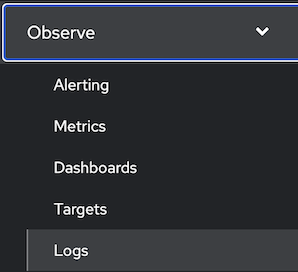
Test with Sample Applications
Deploy sample applications
oc new-project ui oc new-project api oc create -f manifests/frontend.yaml -n ui oc create -f manifests/backend-v1.yaml -n api oc expose deployment/backend-v1 -n api oc set env deployment/frontend-v1 BACKEND_URL=http://backend-v1.api.svc:8080 -n ui oc set env deployment/frontend-v2 BACKEND_URL=http://backend-v1.api.svc:8080 -n ui oc set env deployment/backend-v1 APP_BACKEND=https://httpbin.org/status/201 -n api oc scale deployment/frontend-v1 --replicas=2 -n ui oc scale deployment/frontend-v2 --replicas=2 -n ui oc scale deployment/backend-v1 --replicas=3 -n apiApplication Flow
graph TD; Client--> Route Route-->|Project ui|Frontend; Frontend--> |Project api|Backend; Backend-->|External App|https://httpbin.org/status/201Test sample app
FRONTEND_URL=$(oc get route/frontend -o jsonpath='{.spec.host}' -n ui) curl -v https://$FRONTEND_URLOutput
Frontend version: v2 => [Backend: http://backend-v1.api.svc:8080, Response: 201, Body: Backend version:v1, Response:201, Host:backend-v1-b585d794d-pcw9k, Status:201, Message: Hello, WorldCheck log
- Switch to Developer Console and choose project api
Select menu Observe -> Logs
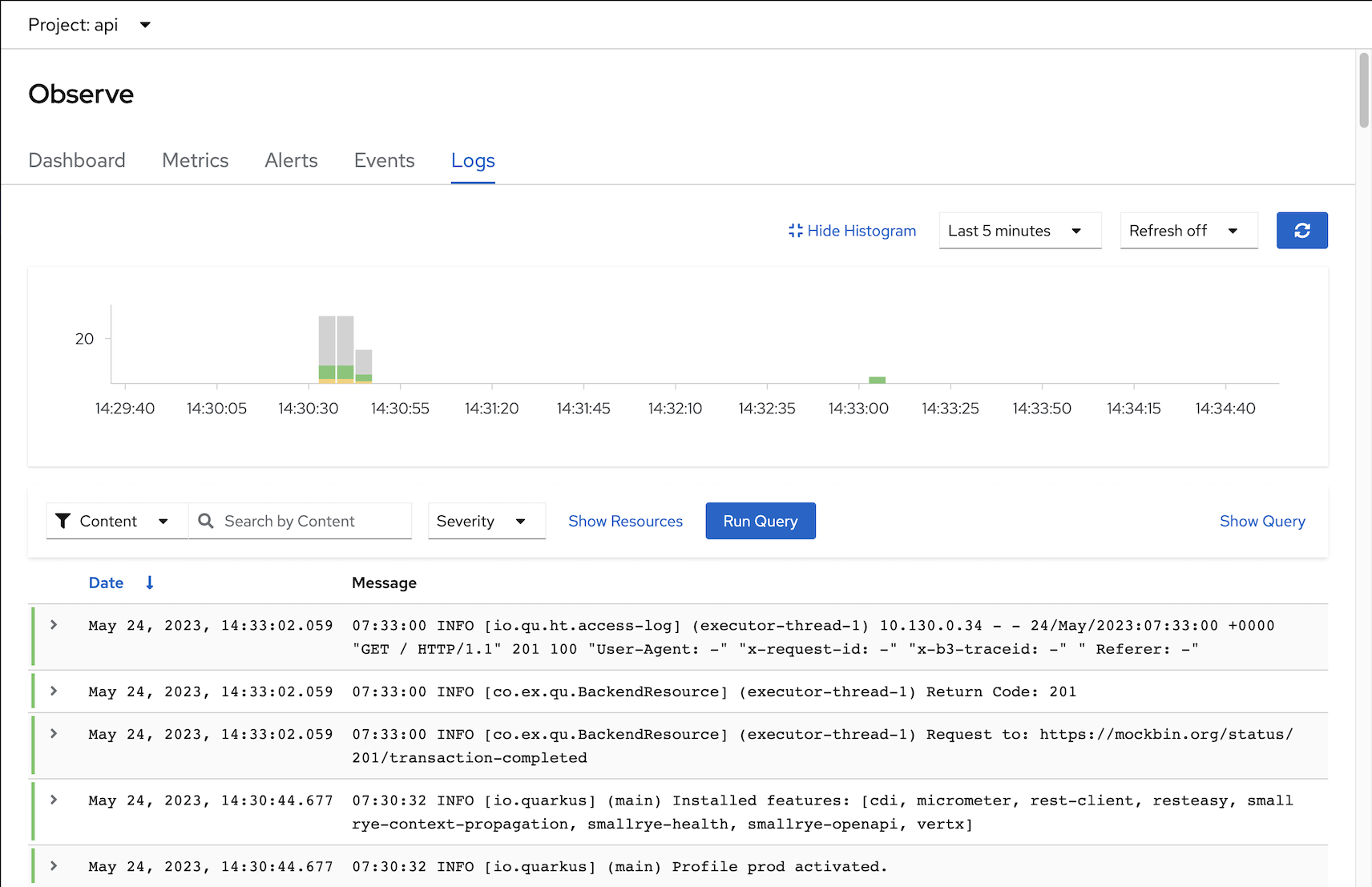
Filter log by Severity
Select Severity
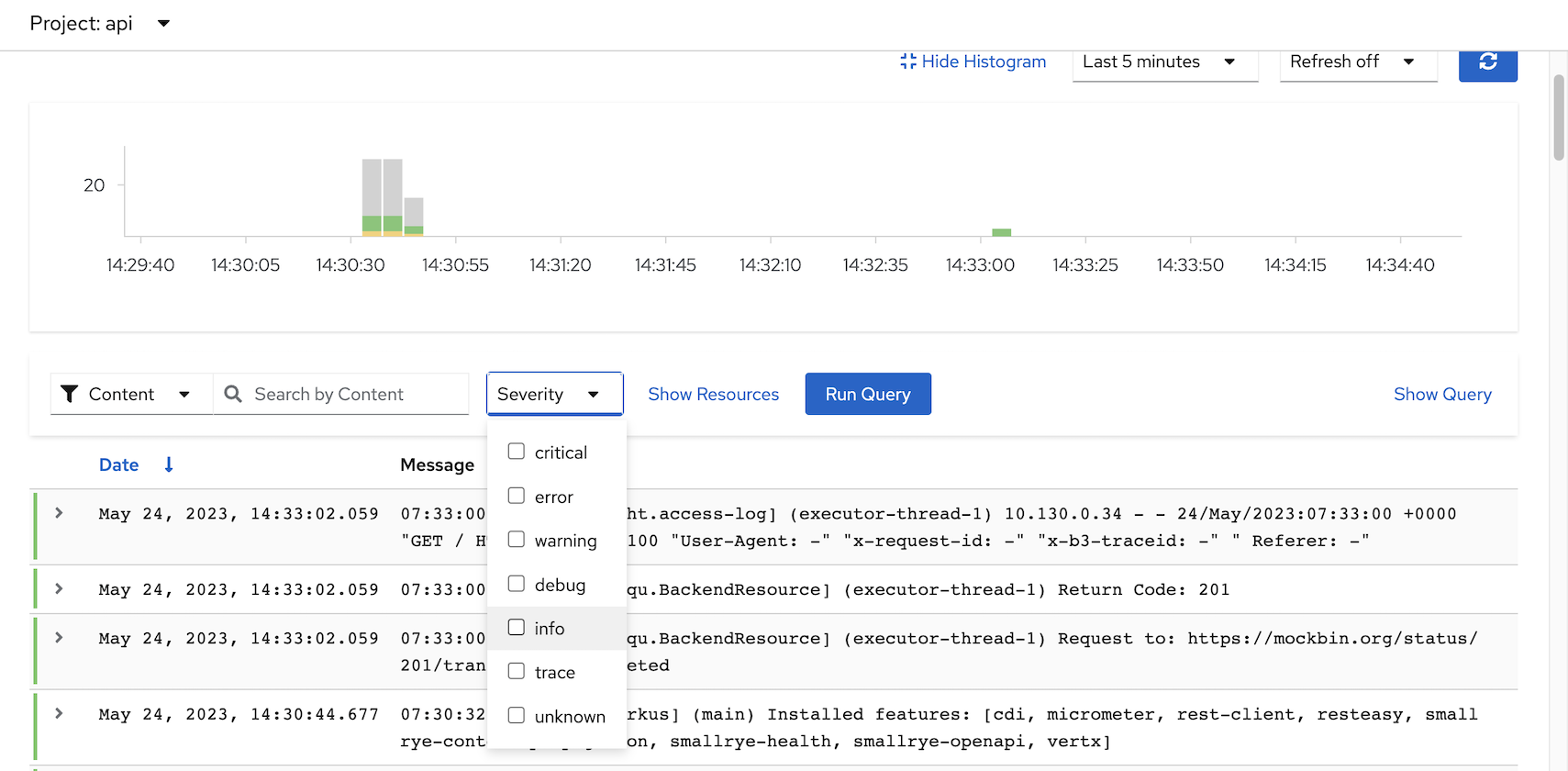
Output
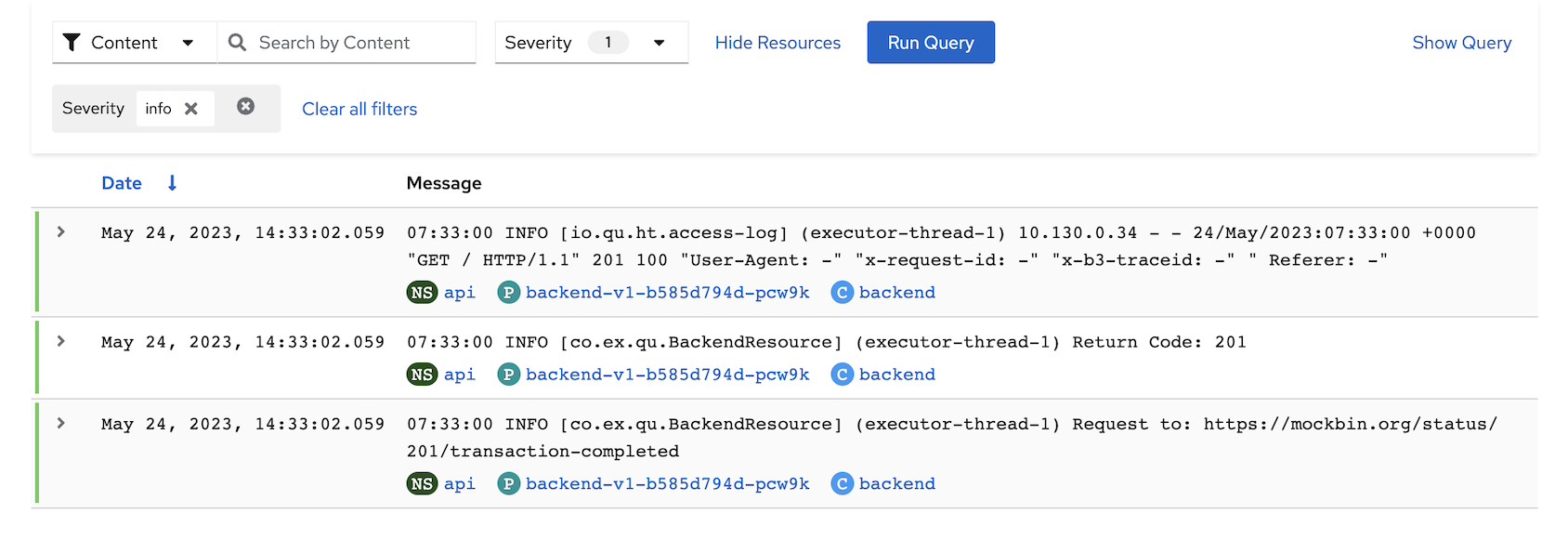
Support for multi-lines error log
Configure backend app to return 500
oc set env deployment/backend-v1 APP_BACKEND=https://httpbin.org/status/500 -n apiTest app
curl -v https://$FRONTEND_URLOutput
< HTTP/1.1 500 Internal Server Error < x-correlation-id: 94235c71-c810-4894-b6fd-41517464060a < x-powered-by: Express < content-type: text/html; charset=utf-8 < content-length: 88 < etag: W/"58-ybUg4JCk2x6Hmz6hGWKXkVMOmdQ" < date: Thu, 04 Jan 2024 03:02:05 GMT < keep-alive: timeout=5 < set-cookie: edf28febca8ee46e0446d33e418fb5c2=fc80b538e2fb152c86546fc1c0328e01; path=/; HttpOnly; Secure; SameSite=None < * Connection #0 to host frontend-ui.apps.cluster-xxx.io left intact Frontend version: v2 => [Backend: http://backend-v1.api.svc:8080, Response: 500, Body: ]Check log
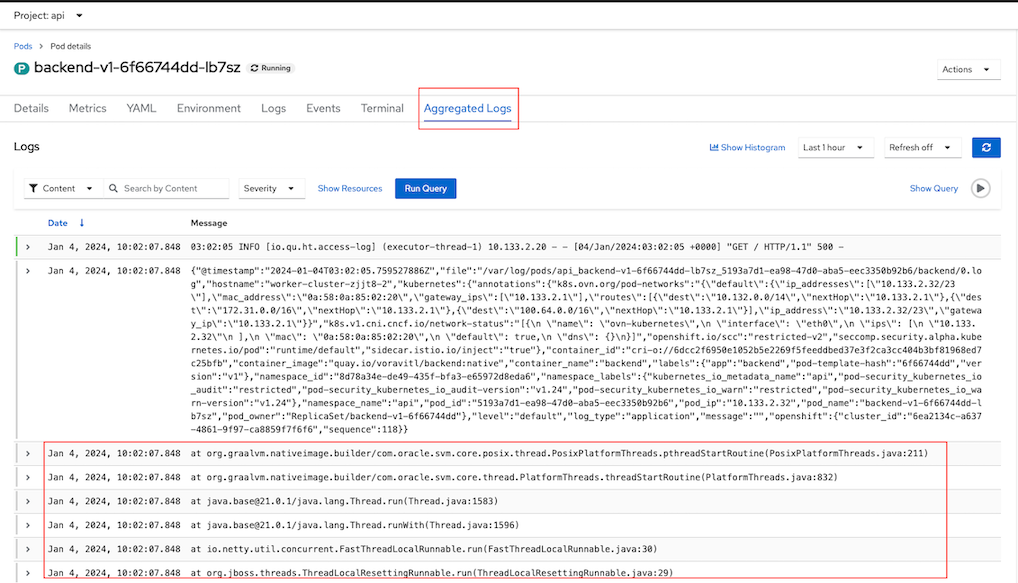
Configure log forward with option detectMultilineErrors
oc create -f manifests/ClusterLogForwarder-detectMultilineErrors.yamlTest app again and check log in Loki
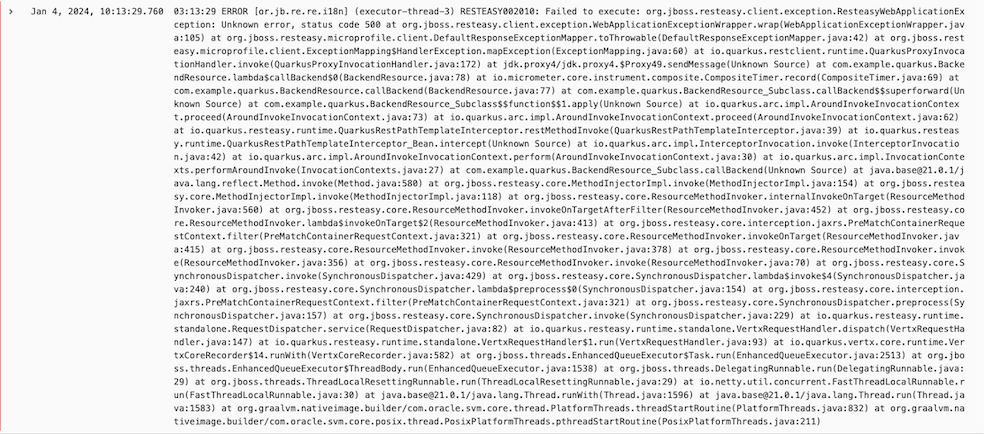
detail
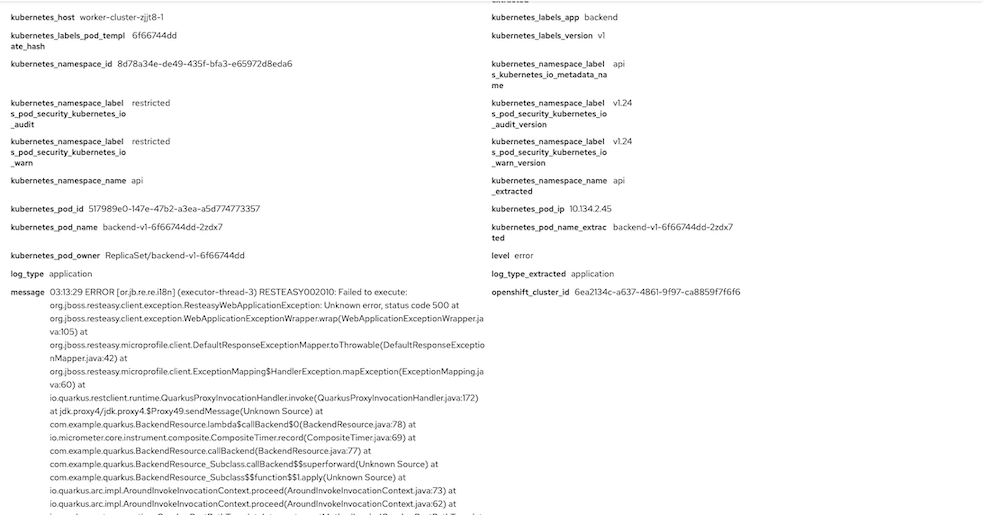
LogQL
- Open Developer Console then select Observe->Log
Click Show Query and input following LogQL to query
- Application Log
- in namesapce api
- only worker node name ip-10-0-215-10.us-east-2.compute.internal
- and contain string Return Code
Remark: replace your worker node hostname to ip-10-0-215-10.us-east-2.compute.internal
{ log_type="application", kubernetes_namespace_name="api" } | json | hostname=~"ip-10-0-215-10.us-east-2.compute.internal" |~ "Return Code: .*"Output
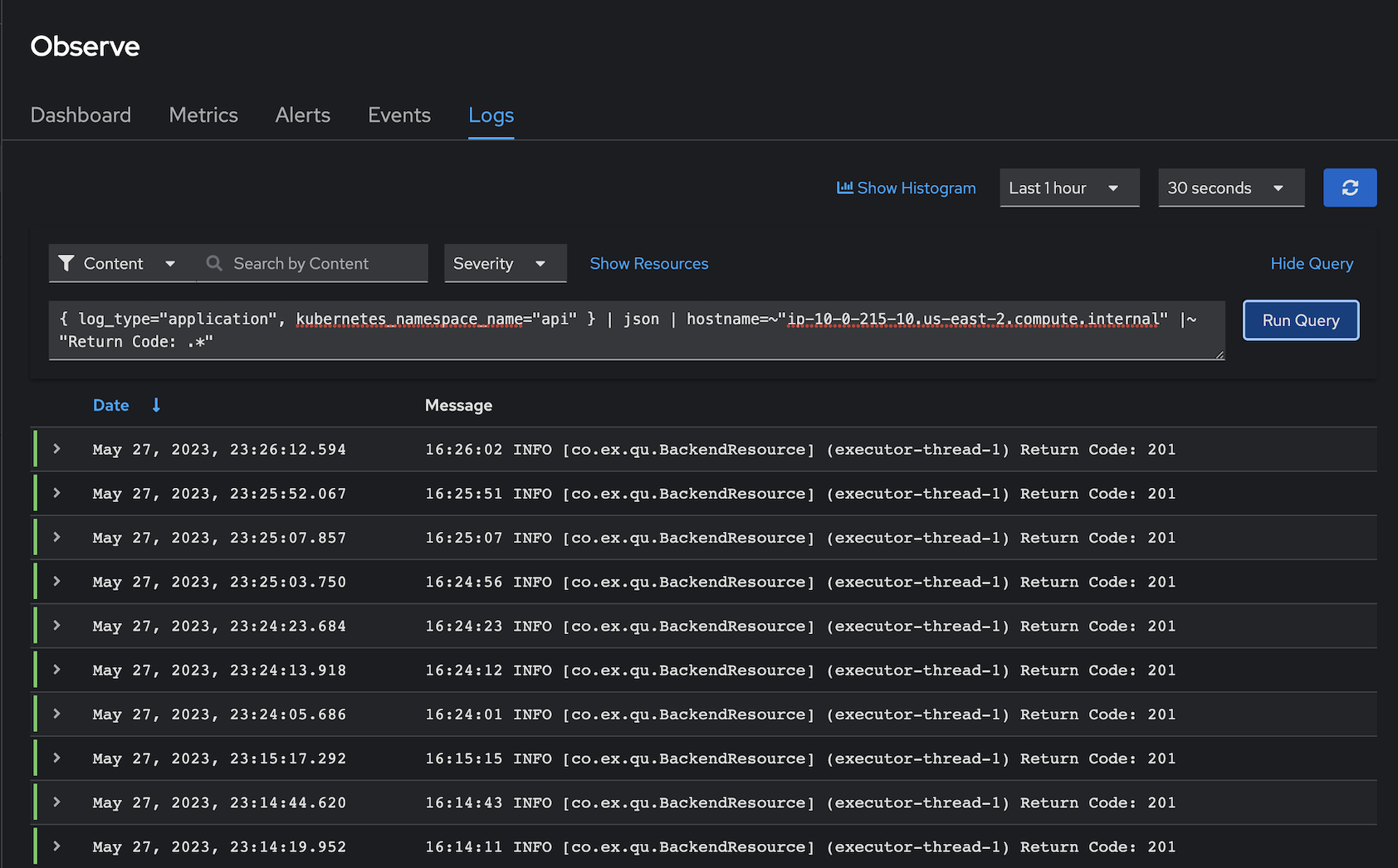
Alert
Label namespace api to match condition for LokiStack to monitor for alert
oc label ns api openshift.io/cluster-monitoring=true[Optional] Add roles to user to manage alert (CRUD)
oc adm policy add-role-to-user alertingrules.loki.grafana.com-v1-admin -n api user1Create Alert Rule
oc apply -f manifests/loki-backend-alert.yamlConfigure backend app to return 500
oc set env deployment/backend-v1 APP_BACKEND=https://httpbin.org/status/500 -n api- Call frontend
Check for alert
